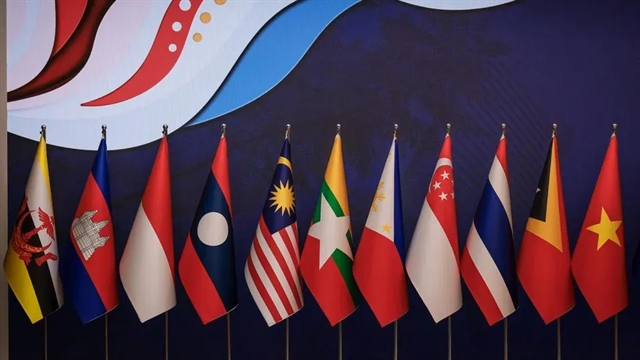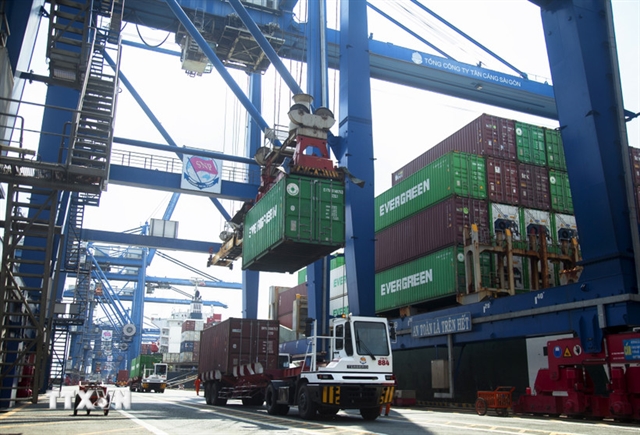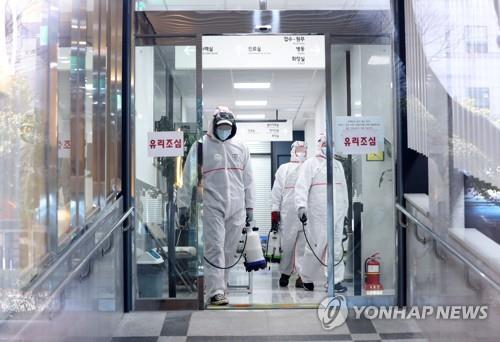 World
World


|
| Health authorities disinfect a hospital in Busan, 450 kilometers southeast of Seoul, on Monday.—YONHAP/VNA Photo |
SEOUL — South Korea reported 60 new confirmed cases of coronavirus on Tuesday, bringing the total infections here to 893. But the cases in the morning update were fewer than the spike of 161 cases a day earlier.
So far, eight people have died in South Korea from the new virus that emerged in China.
Two clusters of infections - at a branch of a religious sect in the southeastern city of Daegu and a hospital in the neighboring county of Cheongdo -- have continued to expand sharply, taking up more than half of the total cases in the country.
The two latest victims of the potentially fatal illness are tied to Daenam Hospital in Cheongdo, near Daegu. Six out of the eight deaths are linked to the hospital where over 110 people were confirmed to have been infected.
Of the 60 new cases, 49 are in Daegu, 300 kilometres southeast of Seoul, and neighboring North Gyeongsang Province. Sixteen new cases were confirmed in Daegu, and 33 new cases were reported in North Gyeongsang Province.
Nearly all major provinces and cities have reported some infections, with Seoul reporting another two cases, the Korea Centre for Disease Control and Prevention (KCDC) said in a statement.
Busan, South Korea's second-largest city, reported three new cases and Gyeonggi Province reported five new cases on Tuesday morning, the KCDC said.
Since raising the virus alert level to "red," the highest level, on Sunday, health authorities have focused on halting the spread of the virus in Daegu and North Gyeongsang Province.
South Korea confirmed its first new coronavirus case from a Chinese woman from Wuhan, the epicentre of the virus outbreak, on January 20.
South Korea has released 22 fully recovered novel coronavirus patients from hospitals as of Tuesday morning, the KCDC said.
The number of people being checked for the virus and under quarantine came to 13,273, it added. The country has tested a total of 35,823 suspected cases, with 22,550 testing negative.
'Maximum' quarantine steps in Daegu
In a related movement, South Korea plans to take "maximum" quarantine steps in the southeastern city of Daegu and its surrounding province to contain the new coronavirus and seek to create an extra budget, party officials said on Tuesday.
The government, the ruling Democratic Party (DP) and the presidential office decided to thoroughly implement stepped-up containment measures in Daegu and North Gyeongsang Province, where infection cases have shot up in recent days.
The government designated Daegu and its nearby county of Cheongdo last week as "special care zones" to better cope with the outbreak of COVID-19.
"The government is studying ways over blockade measures, including mobilising administrative power in terms of movement to some degree. The government will unveil details after the approval at a Cabinet meeting," Rep. Hong Ihk-pyo, DP spokesman, said in a press briefing.
The DP sent a message to reporters that the maximum containment policy means beefing up quarantine efforts, not an imposition of a lockdown.
The participants also agreed to secure reserve funds to quickly support small business owners hit by the virus outbreak and create a supplementary budget as soon as possible.
President Moon Jae-in instructed government officials on Monday to draw up an extra budget over the virus that experts say could amount to more than 10 trillion won (US$8.27 billion). The government's 2020 budget is already a record 512.5 trillion won.
The government will also announce a set of comprehensive measures to minimize the impact of the virus outbreak this week.
The participants decided to request that Moon consider issuing an emergency finance decree if the operation of the National Assembly hits a snag, Hong said.
Under the Constitution, the country's president can issue an emergency presidential order when acute support measures are deemed necessary to deal with serious financial and economic situations.
To stabilise the supply of face masks, the participants decided to require that 50 per cent of daily production be used for public purposes.
The move will enable the government to provide face masks to people stably through local governments, not via commercial distribution channels.
Face masks will be also provided free to the underprivileged and health workers in Daegu and Cheongdo.
Also, South Korea will restrict exports of face masks to 10 per cent of daily production.
The government said it will consider taking legal actions against outdoor rallies that occur despite local governments' warnings.
Public criticism mounted as a group of Protestant followers, led by conservative pastor Rev. Jun Kwang-hoon, pushed ahead with a massive rally at Gwanghwamun Plaza in central Seoul over the weekend despite the city government's warning.
"The move does not target a specific rally, but administrative authorities will actively handle (rallies) if they are deemed to have risks of spreading COVID-19," Hong said.— YONHAP